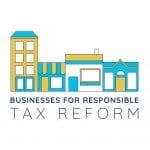FOR IMMEDIATE RELEASE
Today, Businesses for Responsible Tax Reform held a virtual roundtable with small business owners from across the country to hear about the significant challenges they face in accessing emergency programs set up to help them weather the COVID-19 crisis; entrepreneurs unanimously expressed frustration over the Administration’s handling of the PPP program
May 7, 2020--Businesses for Responsible Tax Reform (BRTR) held a virtual roundtable today to hear from small business owners across the country about how they’re surviving the economic fallout of the COVID-19 pandemic, their experiences with the Paycheck Protection Program (PPP) and frustration with the Trump Administration’s handling of the program that allowed corporations to cash in on assistance meant to help Main Street. Business owners also discussed what kind of fixes they need from policymakers, the Administration and regulators to weather this crisis.
“During the first round of the PPP, we learned a hard lesson–that not all small businesses are created equal,” said Shaundell Newsome, owner of Sumnu Marketing in Las Vegas and Chair of the Las Vegas Urban Chamber of Commerce. “This process has exposed, yet again, the disparity in access to capital that has been an issue since I started my firm 14 years ago. The SBA and our legislators need to make it a priority to improve access to capital for small businesses, focusing on very small and minority owned firms in particular.”
During the roundtable, business owners shared their experiences trying to obtain PPP loans to help them keep employees on payroll, and expressed frustration with how the Administration’s implementation of the program has made loans difficult to get and hard to figure out how to use. They also expressed trepidation about the loan forgiveness process saying they are in the dark on what rules will apply.
Carrie Morey, owner of Callie’s Little Hot Biscuit with locations in South Carolina, North Carolina and Georgia, received a PPP loan during the second round, but because she hasn’t been able to bring all her employees back due to social distancing guidelines, is unsure how to use the money.
“I never want to look a gift horse in the mouth, but money doesn’t solve everyone’s problems. I’m very cautious in using the PPP money but I also feel like we need to hurry up and use it for fear we might get to the forgiveness deadline and not have used it all–then be saddled with debt,” Morey said. “I’m hopeful something will change with these rules. For us, it’s going to take months to recover. Even if tomorrow everything were fine and back to what it was like before the pandemic, it’s going to take months for us to get customers to come in the door. There are so many things that haven’t been thought through. I’d like to see the forgiveness period extended through the year because I don’t see things getting back to normal until the fourth quarter at the earliest.”
“The vast majority of the country and businesses are still in lockdown mode. We can bring people back on our payroll, and for some, like marketing and sales people, there are things of value they can do,” said Walt Rowen, owner of Susquehanna Glass, a decorative glass manufacturer in Columbia, Penn., who received a PPP loan in the first round of funding. “But I have a manufacturing business where production employees can’t come into the factory. We can’t get any economic value from them at all. I’m two weeks into my eight-week PPP loan period and I’ve gotten virtually nothing out of it. It’s such a wasted opportunity.”
The entrepreneurs were unanimous in their desire for lawmakers and regulators to listen to small business owners, not corporations or lobbyists. Because if they don’t, America’s Main Streets won’t survive.
Many small business owners had numerous questions for BRTR’s co-chairs, who are small business owners and policy and tax experts, about the details surrounding the PPP loans, and were vociferous in their desire to have policymakers directly target help to true Main Street small businesses–not corporations.
“Lawmakers have got to expand and clarify the rules on the PPP program, and start putting things into place that will have a targeted effect on American’s small businesses, not multi-million dollar corporations,” said Anne Zimmerman, owner of Zimmerman and Co. CPAs in Cleveland and Cincinnati, Ohio, and co-chair of Businesses for Responsible Tax Reform. “Coming out of the Great Recession, small businesses created two-thirds of new jobs. Small businesses need to come out of this alive for the economy to survive this.”
Specifically, many discussed creating no-strings-attached grants for truly small businesses that will allow them to continue employing their workers, and expanding the eight-week forgiveness period so they don’t get stuck with a loan balance they must pay, regardless of whether they retained their entire staff. They also urged the Administration to write rules that attach fewer strings and create more flexibility in the use of PPP funds for truly small firms.
View the full roundtable discussion here.
Media Contact
Conan Knoll
conan@emcstrategies.com
(831) 524-6764
###
About Businesses for Responsible Tax Reform
Businesses for Responsible Tax Reform is a coalition of business leaders calling for tax reform that truly benefits America’s small business owners. We are dedicated to ensuring tax reform is fiscally responsible, creates a level playing field for all businesses, grows the economy and works for our nation’s 30 million small business owners. Learn more about us on our website and follow us on Twitter and Facebook.


